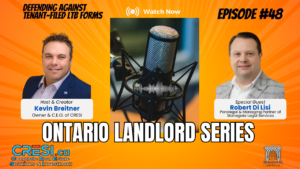What Really Happens at the Landlord and Tenant Board in Ontario
Do you have a tenant who stopped paying rent? Are you thinking about going to the Landlord and Tenant Board? Before you do, there are some important things you need to know.
Most Ontario landlords think the Board works like a regular court. They think if their tenant didn’t pay rent, they’ll win for sure. But that’s not always true.
The Long Wait is Just the Start
Right now, it takes about 3 to 4 months just to get your hearing date in Ontario. That’s already a long time to wait when your tenant isn’t paying you.
But here’s the part that surprises most landlords: Getting a hearing date doesn’t mean you’ll actually be heard that day.
When you show up at the Landlord and Tenant Board in Toronto, Ottawa, Hamilton, or anywhere in Ontario, you get a block number. Maybe you’re number 25. But that doesn’t mean you’re 25th in line. The Board picks cases to hear based on which ones they think will be quick.
Sometimes landlords wait all day and never get heard. Then they have to come back another day.
Why “Slam Dunk” Cases Can Still Lose
Let’s say your tenant owes you $5,000 in rent. You have proof. You did everything right with your N4 form. You think it’s a sure thing.
But at the hearing, your tenant might say: “I stopped paying rent because my toilet was broken for two months.” This is called a Section 82 issue. Now your simple case just got complicated.
Or maybe your tenant is a single mom with kids. It’s winter. She asks for more time. The Board member might give her extra months to move. This is called Section 83. It can delay your eviction even if you win.
Rob Di Lisi from Stonegate Legal Services has seen this happen many times to landlords in the GTA, Ottawa, and across Ontario. That’s why he always says: “Don’t count on winning just because you’re right.”
When Tenants Don’t Show Up
You might think if your tenant doesn’t show up to the hearing, you automatically win. Not quite.
Yes, you’ll probably get an order that day. But later, your tenant can say they never got the notice. They can say they didn’t know about the hearing. In Canada, everyone gets the right to be heard.
So the Board gives them another hearing. That’s another 2 or 3 months of waiting. Another 2 or 3 months of no rent.
Some tenants know this trick. They use it to stay longer without paying.
The Money Problem Nobody Talks About
Let’s say you finally win at the Board. The judge says your tenant owes you $8,000 in back rent. Great! Now you’ll get your money, right?
Not so fast.
To collect that money, you need something called wage garnishment. This means 20% of their paycheck goes to you until the debt is paid.
But what if your tenant:
- Loses their job?
- Gets a new job somewhere else?
- Works cash jobs?
- Leaves Ontario?
Then you’re out of luck. You’ll spend more money trying to find them and restart the garnishment. Most Ontario landlords never collect a penny of back rent.
There’s a Better Way
Here’s what smart landlords in Toronto, Mississauga, Ottawa, and across Ontario are doing instead: They settle before going to the Board.
This is sometimes called “cash for keys.” You give your tenant some money to leave quickly. Maybe $1,000 or $2,000.
At first, this sounds crazy. Why pay a tenant who owes you money?
But think about it like a business:
- You get your unit back in 30 days instead of 6 months
- You can rent it to a good tenant right away
- You save money on legal costs
- You avoid the risk of losing at the Board
- The money you give them might be tax deductible
Rob explains it this way: “Yes, you’re giving them money. But they’re out in 30 days.” In most cases, settling saves you money compared to fighting at the Board.
Keep Your Emotions Out of It
Many Ontario landlords say: “It’s the principle! Why should I pay them?” We get it. It doesn’t feel fair.
But this is a business. The question isn’t what feels fair. The question is: What costs you less money?
Rob is a landlord himself in Ontario. He’s had to settle with his own tenants before. “Everything we tell clients to do, we do ourselves,” he says. “The difference is I see these cases every day. I know what happens.”
What Should You Do?
If you have a tenant who won’t pay rent in Ontario, here’s your action plan:
- Talk to a paralegal first – Before you file anything at the Landlord and Tenant Board, get advice
- Keep records of everything – Every text, every email, every conversation
- Be open to settling – It might save you months and thousands of dollars
- Think like a business owner – What option costs you the least?
- Don’t assume you’ll win – Even perfect cases can lose at the Board
Get Expert Help
Want to hear more about what happens at the Landlord and Tenant Board? Listen to the full episode of the CRESI Ontario Landlord Series podcast. Rob Di Lisi shares real stories and advice from his years helping Ontario landlords.
You can also reach out to Kevin Breitner at CRESI if you need help managing your rental property in Ontario. Making smart landlord decisions starts with having the right information.
Being a landlord in Ontario is tough right now. The rules are complicated. The Board is slow. But knowing what to expect helps you make better choices for your business.
Related: Stress-free tools for landlords



